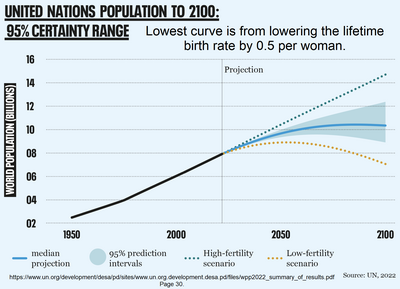 | |
| Founded | 1991; 34 years ago (1991) |
|---|---|
| Founder | David Willey |
| Type | |
| Focus | Promotion of smaller families and sustainable consumption to achieve a population that co-exists in harmony with nature and prospers on a healthy planet. |
| Location |
|
| Method | Campaigning, education, lobbying and research |
| Key people | |
| Website | populationmatters |
| Formerly called | Optimum Population Trust |
Population Matters, formerly known as the Optimum Population Trust, is a UK-based charity that addresses population size and its effects on environmental sustainability. It considers population growth as a major contributor to environmental degradation, biodiversity loss, resource depletion and climate change. The group promotes ethical, choice-based solutions through lobbying, campaigning and awareness-raising.
History and background
Population Matters was launched as the Optimum Population Trust following a meeting on 24 July 1991 by the late David Willey and others concerned about population numbers and sustainability. They were impelled to act by the failure of United Kingdom governments to respond to population growth and threats to sustainability.
The Optimum Population Trust prepared analyses and lobbied on issues affected by population growth. It was granted charitable status on 9 May 2006. Population Matters was adopted as its new name in 2011.
Views and aims
Population Matters highlights how rapid human population growth has fueled the destruction of nature and natural resource depletion. The charity promotes positive, voluntary measures to achieve a sustainable human population size that enables everyone to have a decent quality of life while safeguarding our natural environment.
The United Nations projects that global population size will reach 9.7 billion in the year 2050 and 10.9 in 2100, which illustrates the urgency of the matter, according to the organisation.
Vision
Population Matters' vision is of a future in which our population co-exists in harmony with nature and prospers on a healthy planet, to the benefit of all.
Mission
Population Matters' mission is to drive positive, large-scale action through fostering choices that help achieve a sustainable human population and regenerate our environment.
Solutions

Population Matters promotes five solutions to slow and ultimately reverse population growth:
- Achieve global gender equality
- Remove all barriers to modern family planning
- Quality education for all
- Global justice and sustainable economies
- Promote small family size
In addition, recognising the disproportionately large environmental footprint of wealthy nations, the charity calls for reducing consumption in high-income countries.
Activities
Population Matters campaigns to stabilise population at a sustainable level through encouraging a culture shift towards smaller family sizes worldwide ("Pledge two or fewer") and improving funding for women's empowerment and family planning in lower income countries. Over the years, the organisation has run various campaigns, including supporting Caroline Lucas' Bill to make Personal, Social, Health and Economic education (PSHE) a statutory requirement in state-funded schools. Current campaign and lobbying activity focuses on biodiversity loss and challenging economic concerns regarding birth rate decline. It also informs the public on overpopulation and positive solutions through its communications, events and outreach activities. Finally, the charity undertakes and commissions research to examine some issues in depth, for example, publishing a report on the rise of coercive pronatalism, or exploring the feasibility of lower future population scenarios.
Population Matters publishes the editorially independent Journal of Population and Sustainability, an open access, peer-reviewed, interdisciplinary journal exploring all aspects of the relationship between human numbers and environmental issues.
The charity runs Empower to Plan, a crowdfunding programme that offers members of the public the opportunity to donate directly towards family planning and women's empowerment projects around the world. This project superseded the carbon offsetting project called PopOffsets.
Population Matters is a member of the International Union for Conservation of Nature (IUCN), has consultative status at the United Nations Economic and Social Council (ECOSOC), and is a member of the Wellbeing Economy Alliance.
Organisational structure
Population Matters consists of an operational team of staff and a board of trustees, who oversee the work and strategy. An Expert Advisory Group provides guidance on key issues and the organisation's patrons provide endorsement and support.
Patrons
Population Matters' patrons are prominent public figures who are concerned about the impacts of human population growth, including Sir David Attenborough, Chris Packham, Dr. Jane Goodall, Leilani Münter, Jonathon Porritt, Sir Partha Dasgupta, Professor Paul Ehrlich, and Professor John Guillebaud.
Immigration
In 2015, Population Matters published a blog post disagreeing with an Amnesty International call on the UK and other EU countries to "significantly increase the number of resettlement and humanitarian admission places for refugees from Syria" while saying that these "countries should continue to support migrants from the Syrian civil war and other conflicts in the countries adjacent to those conflicts". The organization subsequently confirmed that this had never been official Population Matters policy and had been repudiated and withdrawn. The Optimum Population Trust had called for numerically balanced or "zero-net" migration to the UK, but did not continue to support this policy as Population Matters. In 2015, Population Matters advocated stopping child benefit and tax credits for third and subsequent children. In 2017, the organization stopped advocating for specific policy changes, replacing them with a call for a Sustainable Population Policy.
See also
References
- "OPTIMUM POPULATION TRUST - Charity 1114109". register-of-charities.charitycommission.gov.uk. Retrieved 23 February 2022.
- "Does Population Growth Impact Climate Change?". Scientific American. Retrieved 5 April 2019.
- "Climate change and population growth are making the world's water woes more urgent". The Economist. 28 February 2019. ISSN 0013-0613. Retrieved 5 April 2019.
- "How does the growing global population affect biodiversity? | Royal Society". royalsociety.org. Retrieved 23 February 2022.
- "Charity framework". Charity Commission. Retrieved 5 April 2019.
- "World Population Prospects 2019 (Key findings)" (PDF).
- "About us". Population Matters | Every Choice Counts | Sustainable World Population. 18 September 2018. Retrieved 20 February 2020.
- UN: 2.4bn more people but is end of growth in sight? July 11, 2022. Population Matters.
- World Population Prospects 2022. Page 30. United Nations Department of Economic and Social Affairs.
- "Solutions". Population Matters | Every Choice Counts | Sustainable World Population. 11 September 2018. Retrieved 20 February 2020.
- "Consume sustainably". Population Matters. Retrieved 28 October 2021.
- "Population Matters charity give Harry and Meghan award for limiting family to two children". Sky News. Retrieved 24 February 2022.
- "Central London Humanists". Meetup. Retrieved 2 June 2016.
- Martin, Roger (23 October 2011). "Why current population growth is costing us the Earth". the Guardian. Retrieved 2 June 2016.
- Currie, Opinion by Alistair. "Opinion: The Pope is wrong. Choosing to have few or no children is the opposite of selfish". CNN. Retrieved 23 February 2022.
- Lucas, Caroline. "PSHE briefing for MPs". Retrieved 2 June 2016.
- "House of Commons Environmental Audit Committee, Biodiversity in the UK: bloom or bust? First Report of Session 2021–22".
- "Population decline good news for climate, says former finance chief". The Independent. 18 October 2021. Retrieved 24 February 2022.
- Perlman, Elisabeth. "Is Elon Musk right to say civilisation will 'crumble' because of low birthrates?". The Times. ISSN 0140-0460. Retrieved 24 February 2022.
- "NCF hosts World Population Day". The Nation Newspaper. 9 July 2019. Retrieved 24 February 2022.
- "Robin Maynard – Battle of Ideas 2018". Retrieved 24 February 2022.
- "More countries 'trying to coerce women into having more children'". The Independent. 30 November 2021. Retrieved 23 February 2022.
- "The Journal of Population and Sustainability". www.whp-journals.co.uk. Retrieved 23 February 2022.
- "Empower to Plan". Retrieved 5 March 2018.
- "IUCN Members". IUCN. 19 May 2016. Retrieved 24 February 2022.
- "Members". Wellbeing Economy Alliance. Retrieved 23 February 2022.
- "Governance". Population Matters. 13 September 2018. Retrieved 24 January 2019.
- "Attenborough's warning on population". BBC News. Retrieved 23 February 2022.
- "BBC Two - Horizon, 2020, Chris Packham: 7.7 Billion People and Counting". BBC. Retrieved 23 February 2022.
- "Population growth should be curbed: British expert Goodall". The Independent. 28 March 2010. Retrieved 23 February 2022.
- Webster, Ben. "Leilani Münter, champion of the child-free, urges women to save the planet". The Times. ISSN 0140-0460. Retrieved 23 February 2022.
- ^ "The charity which campaigned to ban Syrian refugees from Britain". openDemocracy. 23 September 2015. Retrieved 9 June 2016.
- "Population Matters' past policies". Population Matters | Every Choice Counts | Sustainable World Population. 31 January 2020. Retrieved 21 February 2020.
- "Sustainable population policy". Population Matters. Retrieved 24 January 2019.
External links
| Population | |
|---|---|
| Major topics | |
| Population biology | |
| Population ecology | |
| Society and population | |
| Publications | |
| Lists | |
| Events and organizations |
|
| Related topics | |
| Hierarchy of life | |
|---|---|
|
| Extinction | |||||
|---|---|---|---|---|---|
| Phenomena |  | ||||
| Models | |||||
| Causes | |||||
| Theories and concepts | |||||
| Extinction events |
| ||||
| Extinct species | |||||
| Organizations | |||||
| See also | |||||
- Organizations established in 1991
- 1991 establishments in the United Kingdom
- Advocates of women's reproductive rights
- Charities based in England
- Nature conservation organisations based in the United Kingdom
- Human overpopulation think tanks
- Political advocacy groups in England
- Political and economic think tanks based in the United Kingdom
- Population concern advocacy groups
- Population research organizations
- Environmental charities based in the United Kingdom